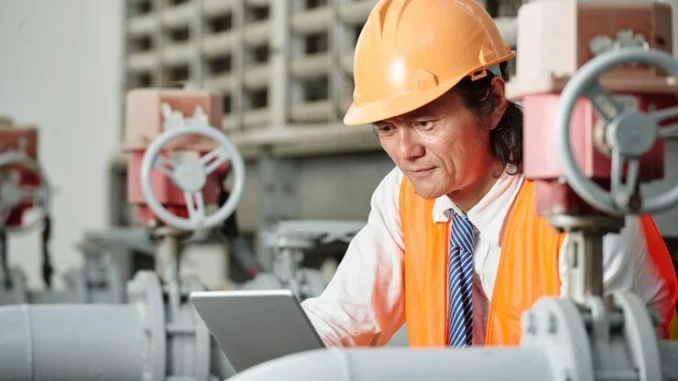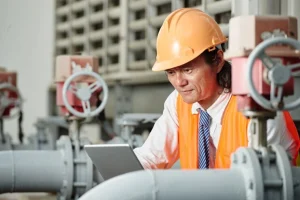
TRAINING GAS TURBINE
DESKRIPSI
Training gas turbine sangat penting untuk memastikan pengoperasian turbin gas yang optimal dalam pembangkit energi. Pengetahuan mendalam tentang cara kerja, pengoperasian yang efisien, serta strategi pemeliharaan yang tepat dapat mengurangi risiko kerusakan dan downtime yang mahal. Dengan mempelajari keterampilan dari pelatihan gas turbine ini, peserta akan mampu meningkatkan efisiensi operasional, memperpanjang usia peralatan, dan memastikan pengoperasian yang aman dan andal dari turbin gas dalam industri pembangkit listrik.
Pelatihan ini membahas mengenai turbin gas terbuka dan tidak tuntas jika mempelajarinya dalam hitungan jam. Oleh karena itu, memerlukan waktu tersendiri dan bimbingan yang profesional.
MATERI
-
Overview of Gas Turbine Technology and Applications
Simple cycle Gas Turbines; cycle considerations; applications; fuels and corrosion; emissions; combined cycle and cogeneration. Overview of Developments High temperature turbines, reheat turbines, close cycles, and other developments.
-
Rotating Components and Matching
Brief overview of compressor and turbine design; component characteristics and matching. Compressor surge and prevention.
-
Vibration and Rotor Dynamics
A review of vibration will include specific problems such as Blade Vibration and Shaft Critical Speeds. Case histories will link vibration with the fatigue failure of components. Rotor instability, in its various forms. Vibration spectrum analysis will be utilised for the solution of resonance, instability, and gear and blade problems. Campbell (Spoke) diagrams and Critical Speed maps will be derived and used for the solution of vibration and Rotor Dynamic problems. The design and performance of Squeeze-Film Damper Bearings for overcoming many of the problems associated with machine unbalance and critical speeds, will be covered.
-
Combustors and Fuels
A description of combustor types, chamber design, fuel atomisation, ignition and combustor arrangements will be presented. Also discussed will be the constraints imposed by fuels on the design and operation of the hardware. The wide spectrum of fuels, both gaseous and liquid, is examined. An overview of fuel treatment and additives will be made.
-
Performance Analysis
Basic thermodynamic aspects of stationary Gas Turbines. Design and off-design operation. Influence of site effects on typical performance maps. Variable geometry compressor and turbine status.
-
Performance Analysis for Problem Detection
The fundamental concepts of performance analysis as a tool for saving energy costs are discussed. Basic and applied thermodynamics will be reviewed for gas turbines. The use of performance data to pinpoint problem areas will be discussed. Diagnostics related to fouling, nozzle erosion, bowing surge, choke, etc. will be covered. Meaningful trending methods will also be discussed.
-
Gas Path Analysis for Stationary Gas Turbines – Status
Simulation of degraded Gas Turbines, derivation and application of fault coefficient matrix, fault trees and other techniques. Implications for component life and emissions.
-
Gas Turbine Fouling
The causes, effects and detection of fouling in axial compressors will be covered including aero thermodynamic effects, effects on surge margin, intake distortion and blading problems. Filtration and control techniques will be covered.
-
Gas Turbine Repair
The techniques of inspection and repair of gas turbines are described in detail, including NDT techniques, cleaning, plating, heat treatment, welding, etc.
-
Maintenance
Case histories of various types of failures and maintenance problems of onshore and offshore gas turbine compressor installations are discussed. Maintenance techniques using bore scope and spectrum analysis including acoustic monitoring are discussed. Techniques for checking and conducting repairs on impellers, diffusers, bearings, couplings, and foundation repair are emphasised.
-
Special Considerations for CHP Gas Turbines
This section will cover special considerations in design, operation and maintenance of turbines and associated equipment on Cogeneration Services. Several cases will be covered. Off design operation effects on HRSG, STTG Cycles and evaporate cooling will be covered.

SIAPA YANG DAPAT MENGIKUTI TRAINING INI?
- Operator Turbin Gas
- Teknisi Perawatan Mesin
- Engineer Energi
- Manajer Pembangkit Listrik
- Supervisor Pemeliharaan
TRAINER PADA TRAINING INI
Instruktur yang berpengalaman dalam bidang pengoperasian turbin gas akan mengisi pelatihan maintenance turbin gas uap generator.
JADWAL PELATIHAN 2026
- BATCH 1 : 05-06 Januari 2026 | 19-20 Januari 2026
- BATCH 2 : 02-03 Februari 2026 | 18-19 Februari 2026
- BATCH 3 : 09-10 Maret 2026 | 25-26 Maret 2026
- BATCH 4 : 06-07 April 2026 | 27 – 28 April 2026
- BATCH 5 : 04-05 Mei 2026 | 18-19 Mei 2026
- BATCH 6 : 08-09 Juni 2026 | 22-23 Juni 2026
- BATCH 7 : 06-07 Juli 2026 | 20-21 Juli 2026
- BATCH 8 : 03-04 Agustus 2026 | 19-20 Agustus 2026
- BATCH 9 : 07-08 September 2026 | 21-22 September 2026
- BATCH 10 : 05-06 Oktober 2026 | 19-20 Oktober 2026
- BATCH 11 : 02-03 November 2026 | 16-17 November 2026
- BATCH 12 : 07-08 Desember 2026 | 14-15 Desember 2026
Calon peserta dapat menyesuaikan jadwal tersebut sesuai dengan kebutuhan
Upgrade diri anda dengan mengikuti pelatihan Bersama kami, berkembang Bersama NISBI Indonesia!
LOKASI
- Yogyakarta, Hotel Dafam Malioboro (6.000.000 IDR / participant)
- Jakarta, Hotel Amaris Tendean (6.500.000 IDR / participant)
- Bandung, Hotel Golden Flower (6.500.000 IDR / participant)
- Bali, Hotel Ibis Kuta (7.500.000 IDR / participant)
- Lombok, Hotel Jayakarta (7.500.000 IDR / participant)
INVESTASI
Investasi pelatihan tersebut menyesuaikan dengan jumlah peserta (on call). *Please feel free to contact us.
Apabila perusahaan membutuhkan paket in house training, anggaran investasi pelatihan dapat menyesuaikan dengan anggaran perusahaan.
BENEFIT
- Module / Handout
- FREE Flashdisk
- FREE Bag or bagpack (Tas Training)
- Training Kit (Dokumentasi photo, Blocknote, ATK, etc)
- 2x Coffee Break & 1 Lunch
- FREE Souvenir Exclusive
